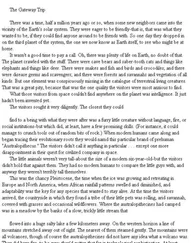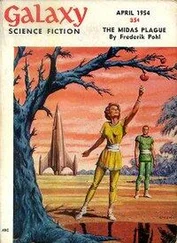Pohl, Frederik - The Age of the Pussyfoot
Здесь есть возможность читать онлайн «Pohl, Frederik - The Age of the Pussyfoot» весь текст электронной книги совершенно бесплатно (целиком полную версию без сокращений). В некоторых случаях можно слушать аудио, скачать через торрент в формате fb2 и присутствует краткое содержание. Жанр: Старинная литература, на английском языке. Описание произведения, (предисловие) а так же отзывы посетителей доступны на портале библиотеки ЛибКат.
- Название:The Age of the Pussyfoot
- Автор:
- Жанр:
- Год:неизвестен
- ISBN:нет данных
- Рейтинг книги:4 / 5. Голосов: 1
-
Избранное:Добавить в избранное
- Отзывы:
-
Ваша оценка:
- 80
- 1
- 2
- 3
- 4
- 5
The Age of the Pussyfoot: краткое содержание, описание и аннотация
Предлагаем к чтению аннотацию, описание, краткое содержание или предисловие (зависит от того, что написал сам автор книги «The Age of the Pussyfoot»). Если вы не нашли необходимую информацию о книге — напишите в комментариях, мы постараемся отыскать её.
The Age of the Pussyfoot — читать онлайн бесплатно полную книгу (весь текст) целиком
Ниже представлен текст книги, разбитый по страницам. Система сохранения места последней прочитанной страницы, позволяет с удобством читать онлайн бесплатно книгу «The Age of the Pussyfoot», без необходимости каждый раз заново искать на чём Вы остановились. Поставьте закладку, и сможете в любой момент перейти на страницу, на которой закончили чтение.
Интервал:
Закладка:
Happily it was the right button. What the fine mist that danced into his wrist might be he did not know, but it achieved the expected effect. It was like a supertranquilizer; it cleared his mind, quieted his pulse, and enabled him to say, quite calmly, “Machine! Just who the hell have you got me working for?”
“Do you wish me to display a picture of your employer, Man Forrester?”
“You damn bet I wish!”
“Please observe the view-wall, Man Forrester.”
And observe it Forrester did; and he swallowed hard, stunned.
In all justice to the joymaker, Forrester was forced to admit that he had placed no restrictions on its choice of an employer for him. He had been willing to accept almost anything, but all the same he was surprised.
He hadn’t expected his employer to have bright green fur, or a diadem of tiny eyes peering out of a ruff around a pointed head, or tentacles. He had not, in fact, expected it to be one of the enemy, the race whose presence in space had scared mankind into a vast series of raid drills, weapons programs, and space probes . . . in short, a Sirian.
Nine
Forrester could have carried on his new duties anywhere. But he didn’t want to, he wanted to return to the nest; and there in his room he wrestled with the joymaker and the view-wall and emerged with some sort of picture of what the Sirians were and what they were doing on Earth.
There were eleven of them, as it turned out. They were neither tourists nor diplomats. They were prisoners.
Some thirty years earlier, the first human vessels had made contact with the outposts of the Sirian civilization—a civilization much like the human in the quality of its technology, quite inhuman in terms of the appearance of its members and in their social organization. The human exploring party, investigating an extrasolarian planet, had encountered a Sirian ship nosing about a ringlike structure orbiting that planet.
Forrester, having learned that much, had already discovered some enormous gaps in his knowledge. Why hadn’t somebody said something to him about men exploring extrasolar space? Where was this system? And what was the orbital ring? It puzzled and confused Forrester; evidently it was not a Sirian structure and it certainly was not man’s. But he avoided the proliferation of questions in his mind and stuck to the straight line of the first encounter with the Sirians.
The Earth ship was loaded for bear. Having found bear, it pushed all the buttons. The commander may or may not have been given discretion about the chances of alien contact and what to do when and if it happened. But he wasted no time in contemplating choices. Everything the Earth ship owned lashed out at the squat, uneven Sirian vessel—lasers and shells, rockets and energy-emitting decoys to confuse and disrupt its instruments. The Sirians didn’t have a chance. Except for a few who were found still alive in space tanks—their equivalent of suits—they all died with their ship.
The Earthmen brought them warily aboard, then turned tail and fled for home. (Years later, remote-operated probes cautiously returned to look at the scene. They discovered that even the wreckage of the Sirian ship was gone, apparently retrieved by . . . someone. Whereupon the probes fled, too.)
Fourteen Sirians had survived the attack. Eleven of them were still alive and on Earth.
Forrester, watching the picture-story of the Sirians spread across his view-wall while the joymaker stolidly recited the facts of their exile, could not help feeling a twinge of sympathy. Thirty years of imprisonment! They must be getting old now. Did they hope? Did they despair? Were their wives and kiddies waiting back in the nest, or hatching pond, or burrow?
The joymaker did not say; it said only that the Sirians had been thoroughly studied, endlessly debated—and released. Released to house arrest.
The Parliament of Ridings had passed laws about the Sirians. First, it was, from that moment, cardinal policy to avoid contact with their home planet. It was possible that the Sirians would not attack even if they discovered Earth—but it was certain that they wouldn’t if they didn’t. Second, the Sirians now in captivity could never go home. Third—mankind prepared for the attack it hoped would not come.
So the Sirians were spread across the face of the earth, one to a city. They were provided with large subsidies, good living quarters, everything they could want except the freedom to leave and the company of their kind. Every one of them was monitored—not with a mere joymaker. Transponders linked to the central computing nets were surgically built into their very nervous systems. The whereabouts of each was on record at every moment. They were informed as to the areas forbidden to them—rocket landing grounds, nuclear power stations, a dozen other classes of installations. If they ignored the warning, they were reminded. If they failed to heed the reminder, they got a searing jolt of pain in the central nervous system to emphasize it. If that did not stop them, or if for any reason their transponders lost contact with the central computer, they would be destroyed at once. Three of them already had been.
At that moment the mellow chime sounded, the view-wall flickered and changed its picture, and Forrester was face to face with his employer.
It was just like the picture he had seen before.
Maybe it was the same Sirian. But it was looking at him now, or seemed to be, although it was hard to tell from the dozens of tiny eyes that rimmed its upper parts, and it spoke to him.
“Your name,” it said in hollow, unaccented English, “is Charles Dalgleish Forrester, and you work for me and you call me S Four.”
It sounded like a robot talking. More like a robot than the joymaker itself.
“Right, S Four,” said Forrester.
“You tell me about yourself.”
It sounded like a reasonable request. “All right, S Four. Where do you want me to begin?”
“You tell me about yourself.” The tentacles were rippling slowly, the circlet of tiny eyes winking at random like the lights on a computer. He had been wrong about its sound, Forrester decided. It was more like a dubbed-in voice in a foreign film on the Late Show—back when there were foreign films and Late Shows.
“Well,” said Forrester ruminatively, “I guess I can start with when I was born. It was the nineteenth of March, nineteen thirty-two. My father was an architect, but at that time he was unemployed. Later he worked as a project supervisor for the WPA. My mother—”
“You will tell me about WPA,” interrupted the Sirian.
“It was a government agency designed to relieve unemployment during the Depression. You see, at that time there were periodic cyclic imbalances in the economy—”
“You will not lecture me,” interrupted the Sirian, “and will explain terms for which letters WPA are function of entity.”
Dashed, Forrester tried to put in concrete terms the business of the New Deal’s work relief program. Only concrete terms would do. The Sirian was distinctly not interested in Forrester’s digressions into economic theory. Probably he liked his own theories better. But he seemed interested in, or at least did not interrupt, a couple of jokes about leaf-raking and about a WPA worker falling down when someone kicked the broom he was leaning on. The Sirian listened impassively, the girdle of eyes twinkling, for half an hour by the clock; then it said, cutting through Forrester’s description of his high school graduation, “You will tell me more at another time,” and was gone.
And Forrester was well enough pleased. He had never talked to a Sirian before.
Although the children were romantically thrilled, Adne did not approve when she heard about it. Not in the least. “Dear Charles,” she said patiently, “they’re the enemy. People will say you are doing an evil thing.”
Читать дальшеИнтервал:
Закладка:
Похожие книги на «The Age of the Pussyfoot»
Представляем Вашему вниманию похожие книги на «The Age of the Pussyfoot» списком для выбора. Мы отобрали схожую по названию и смыслу литературу в надежде предоставить читателям больше вариантов отыскать новые, интересные, ещё непрочитанные произведения.
Обсуждение, отзывы о книге «The Age of the Pussyfoot» и просто собственные мнения читателей. Оставьте ваши комментарии, напишите, что Вы думаете о произведении, его смысле или главных героях. Укажите что конкретно понравилось, а что нет, и почему Вы так считаете.












